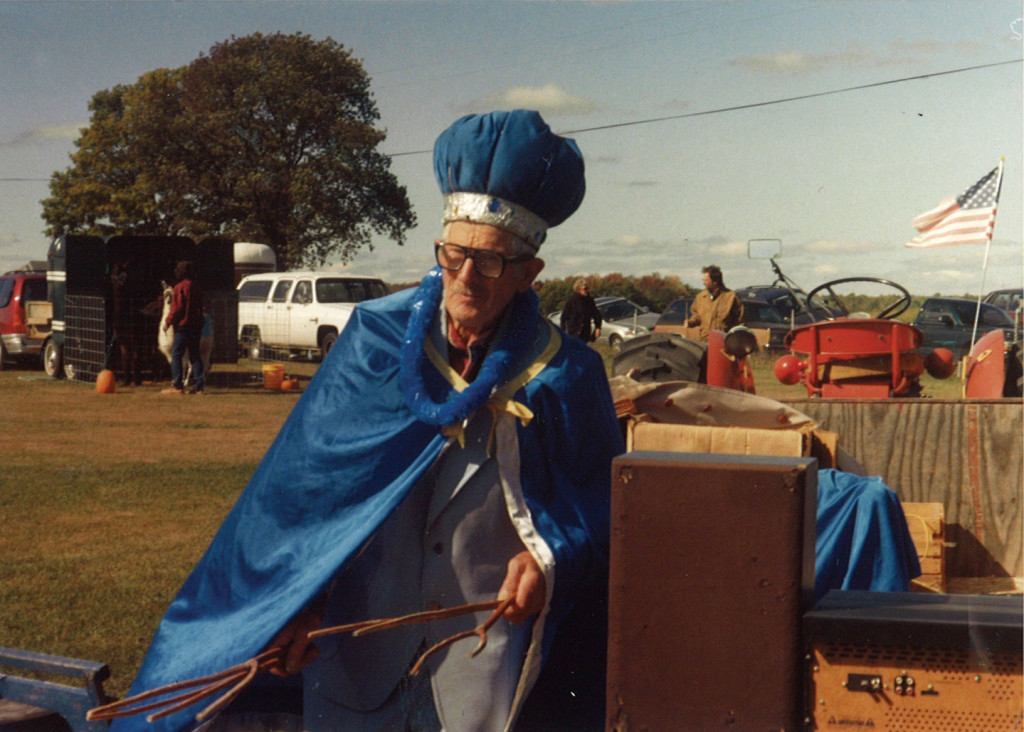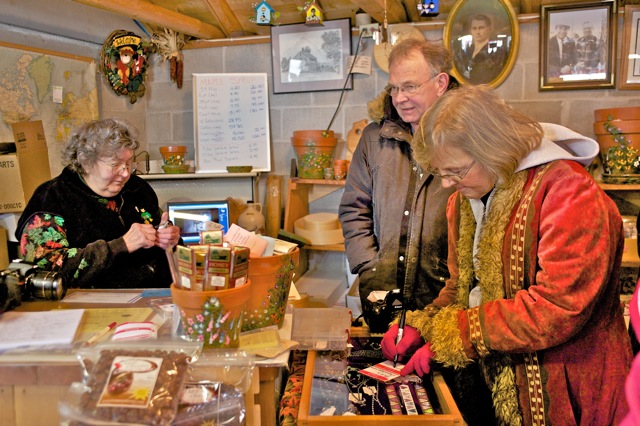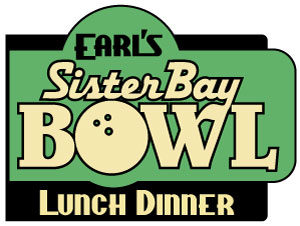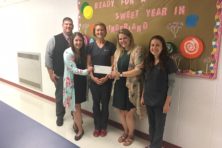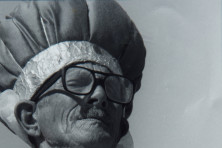What Makes a Local a Local in Door County?
- Share
- Tweet
- Pin
- Share

Every town has its “locals.” In some towns they’re called “old-timers,” in others they might be referred to as “the good old boys.” Sometimes they’re called “natives.” Some people use the words interchangeably and toss them about casually, while others reserve the words for a strictly defined subset of the population.
But on a peninsula where the population mushrooms in the summer months, and in which transients come and go like indecisive boomerangs for years, defining a local is no easy proposition.
It’s also a touchy question for some. Bob Brandriff recalled the time a newspaper photographer took a picture of him and some friends at a table at the coffee shop and put it in the paper under a heading to the effect of “the locals gather for coffee at Espresso Lane.”
“I thought right away, this is going to be trouble,” Brandriff recalls. “It was nice, the only problem was, none of us were actually locals.”
So when the question “What makes a local a local?” hit the table at our Door County Living editorial meeting, I kept my eyes on the notes in front of me and my mouth shut. I knew the article assignment would make its way onto the lap of the only Door County native at the table – me – and it did.
Assignment in hand, I had to narrow the scope. Door County is just too big, its towns so different, that defining a “Door County Local” is nearly impossible. Washington Island? That’s a story of its own. So I trim it down to Northern Door, with its high proportion of part-time residents and visitors providing an interesting twist.
Then I have to break the population into a few baseline categories. Some of us are “natives” (born here, raised here, high school here); then there are the “transplants” (born elsewhere, moved here; and powered through at least one winter here), and finally there are the “locals,” the category I would strive to define. The method: hit the Northern Door tavern circuit on a Tuesday in March, when the transient crowd is at its weakest point.
The Transplant
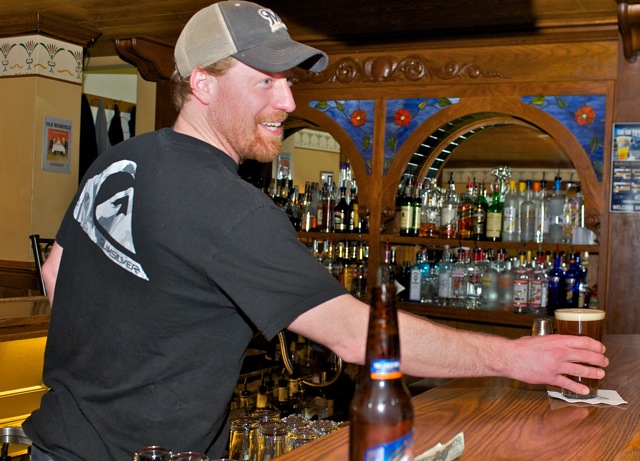
Brandon Fabry was once a “transplant,” but after 10 years bartending at two of the peninsula’s mainstay taverns, he’s at least a “local transplant.” Photo by Paula Hedeen.
Brandon Fabry was born in Green Bay (the Emerald City to many locals), but has lived in Door County year round for 10 years. From his post behind the taps at the ‘Slide in Fish Creek, he grappled with my question, “Do you consider yourself a local?”
“I would like to think I would be by now,” Fabry says, with a hint of self doubt in his tone. He visited the peninsula often as a kid and followed the traditional route to residency by working a few summers in area restaurants while heading south for the winter. “I feel like a local. I call people out for not being a local, so does that make me a local?”
Jason Rockwell, a Sturge native, steps out of the kitchen to grab a glass of water while the eyes of Coonie Fish stare down Fabry from across the bar.
“You’d call me a local at this point, right?” Fabry says to Rockwell, almost hopefully.
“You’re a transplant,” Rockwell replies without a moment’s hesitation. Fabry makes a case for something better.
“Would you call me a local transplant, at least?” Fabry begs.
“Maybe,” Rockwell says. “But transplants, they don’t always take.”
“Can we breed?” Fabry asks.
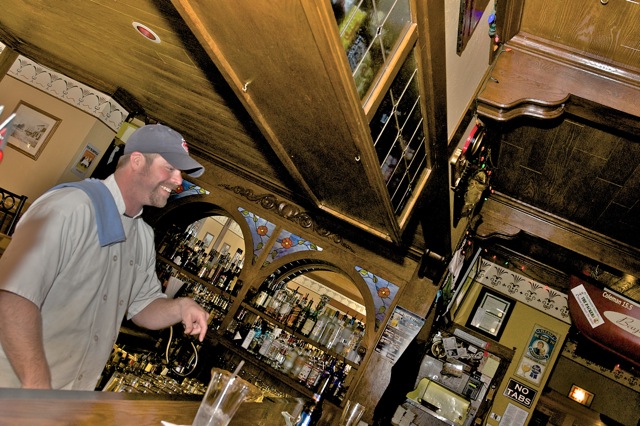
Jason Rockwell, a Sturgeon Bay native now bartending at The Bayside. Definitely local. Photo by Paula Hedeen.
With that, Rockwell shakes his head and returns to the kitchen. Fabry carries on, discussing what the qualifications might be for a transplant to become a local, if it’s possible.
“I think it takes getting socially involved with people,” he says. “I would think you’d have to spend at least a couple of winters here. I mean, you can spend 20 summers visiting or working here, but you still aren’t a local until you gut it out in the winter.”
Made Man?
On the north end of Sister Bay there’s an old garage and filling station, one without the gloss of the modern gas stations whose logos blare from the sides of America’s highways. Inside Sister Bay Automotive is the wood paneling that carries the smell of decades of grease, oil, and gas.
Outside Ken Church is working on the inside of the roof of a white minivan, contorting himself into the uncomfortable head-to-the-sky, inverted back arch, legs sprawled position that mechanics perfect through decades on the job. Ken is the owner, with his wife Candy, of the station that couldn’t feel more authentically local if the sign said “Local Gas.”
But on the windows to the office are a couple decals, one for the Chicago Bears and one for the Chicago Cubs. While Candy (maiden name Kwaterski) is a native of Northern Door, Ken is originally from Illinois and “only” moved to Sister Bay in 1970. After 41 years under the hoods of thousands of local automobiles, is Ken Church a local?
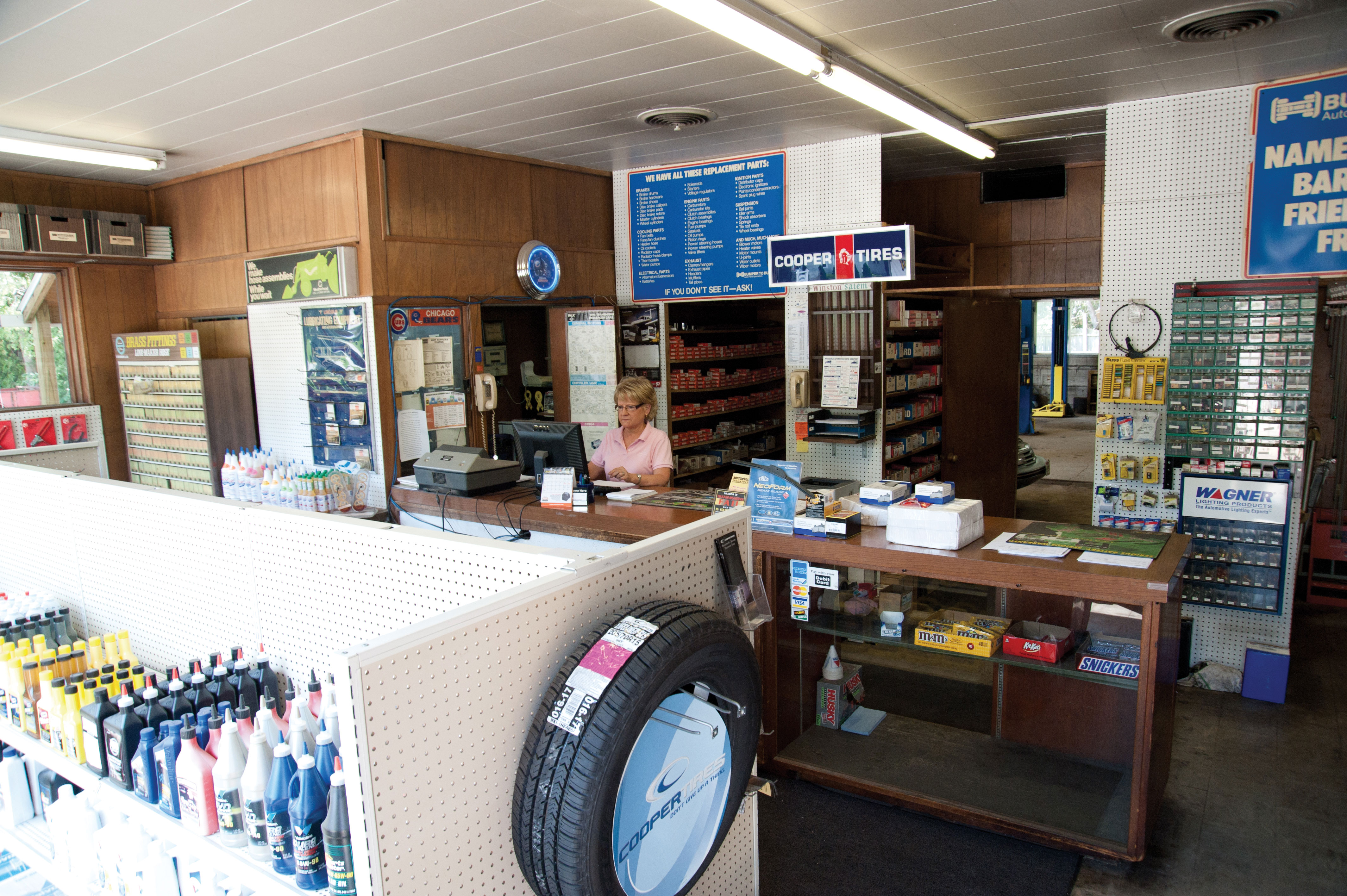
Candy Church behind the counter at Sister Bay automotive. She’s certainly local. Her husband? Maybe. Photo by Myles Dannhausen Jr.
On instinct, Ken calls himself a transplant, saying that you have to be born here to be a local, but after some thought he changes his mind.
“I think living here for 40 years is enough to make you a local, isn’t it?” he says. If those years aren’t enough, maybe his seven terms on the Sister Bay Village Board make up for the remaining gap. But as he talks his son Chris – who was born here – walks around the front of my car as it sits on the lift where he’s fixing a leak in my tire.
“You’re still a FIB,” he says with a slight chuckle.
But Candy, whose bloodlines go back generations, makes the case for those like her husband.
“A local lives here year round,” she says, echoing Fabry’s sentiments. “At least 12 months. If you live here year round, if you can make it through the winter financially and mentally, then you’re a local.”
Ken doesn’t plead his case too hard, though he does amend his initial definition. “You can’t just be born here and take off, then come back to visit and call yourself a local,” he says.
Like Ken, Mike Termini, was born in Illinois. The 32-year-old Sister Bay man moved to Northern Door when he was in grade school, and he considers himself 100 percent local.
“Years lived here matter as you get older,” he says from a comfortable perch on a bar stool not far from where Emma Husby once doled out her famous black cows. “Are you more local if you were born here and moved away at 18, or if you moved here at 18 and live here for 20 years? After all, the majority of property owners here, or close to a majority, were transplants at some point.”
Termini says the times of the year when he feels most at home – Fall Festival, the holidays, Winter Fest, Fourth of July – feel that way in large part because all those people who moved away come home, and all those regular visitors and summer residents come back. That feels a lot more like Door County to him, he says, than the dead days of March when the “year round” people are all still here but in near hibernation.
Rooted
There’s no question Leif Mickelson is a native, and certainly a local, but those terms aren’t strong enough. The man has roots. His Door County lineage dates to the 1870s, and he defines a local strictly.
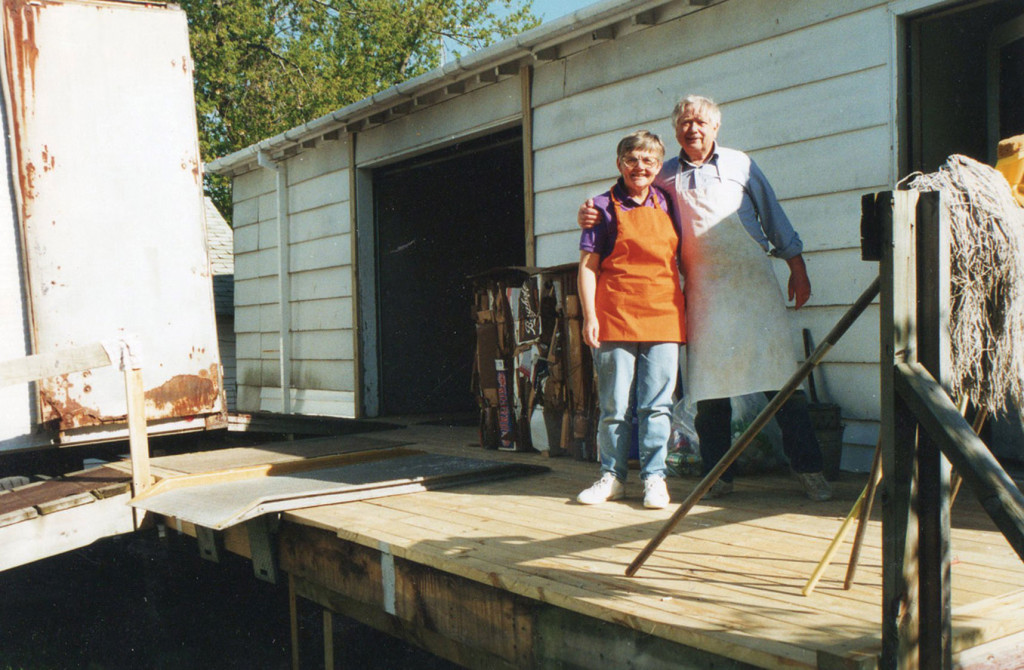
Visitors stopped into Ann and Gary Norz’s Fish Creek deli for sandwiches for decades. Locals didn’t get a sandwich, they got a Norzwich. Submitted.
“You have to have been born here, and stayed here,” he says from his seat at the bar where crowds once danced to the sounds of The Birminghams every Friday night. He offers a compelling local test: “When someone comes here on vacation and asks, ‘Are you from here?’ What do you say? If you’re a local, you’ll say yes. If you’re not, you’ll say somewhere else. They’ll usually say when they moved here and where from.”
But that stringent definition would mean the late Al Johnson, among many others less well known, wouldn’t qualify as a local.
Down the bar a couple stools sits Heather Laughlin, who was born and raised here. Her husband Jim moved to the area when he was 16, but Heather calls Jim a bona fide local. “I feel like he’s more of a local than I am!” she says. “He knows everybody.”
When one’s local credentials are questioned, it can lead to a heated argument, but though Mickelson may have a stringent definition he says he doesn’t use the label in judgment.
“Just cause I don’t call you a local,” he says earnestly, “doesn’t mean I don’t like you.”
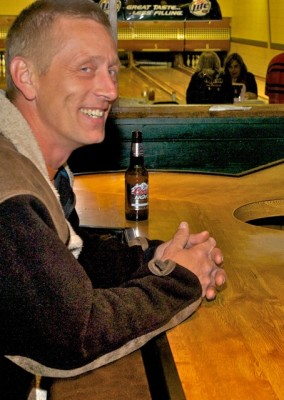
Leif Mickelson near the local’s favorite seats on the bubble at the Sister Bay Bowl. Photo by Paula Hedeen.
After all, as native-born Mike Daubner of the Sister Bay Bowl points out, “If we didn’t have the people not from here, there wouldn’t be any locals here.”
There is, however, a certain kind of reflexive protectiveness about Door County among locals. When someone moves in from out of town and buys a local staple business, people put up their guard. A new business owner has a lot to prove before the locals will accept and support them.
“When somebody buys a place and they’re from out of town, you go, ‘uh-oh.’” Mickelson said. “You’re a little disappointed, because another place might be lost. I’m 44, and I’ve seen a lot change since I was a kid, and my dad has seen a lot more.”
How local?
Though I was born at Door County Memorial Hospital in Sturgeon Bay and raised in Egg Harbor, this story assignment got me thinking about my own local status. I was born seven years after my parents moved to Door County from Chicago. They were following my grandparents who had retired here. I’ve lived almost all of my 32 years here, and Mickelson says that makes me absolutely local. Still, there are different depths behind the local label.
Growing up I lacked the deep Door County roots of many of my friends. I grew up in Egg Harbor, played my Little League baseball (poorly) behind the fire station on School Road, and went to Gibraltar Schools in Fish Creek.
According to Brandriff, who says he’s not a local despite living here for decades (he calls himself “just a resident”) I more than meet the baseline qualifications. “You don’t have to have been born here, but you have to have gone to school here, that’s what they tell me,” he says.
Still, I often felt a bit like an outsider. My family didn’t seem to have all the deep connections to other residents that my friends seemed to have. I never thought to ask them before, but I had to ask if my own parents, after 40 years living in Egg Harbor, working and owning businesses in Door County, do they consider themselves local?
When I ask my dad what makes a local a local, it’s clear he’s thought about it, because he replies quickly. “I always think that you become a local,” he says, “when people forget where you came here from.”
My mom says she only recently felt like she qualified, and remembers when it was.
“I felt like we were accepted when an old-time local family took us out to dinner, and when they talked to us, they talked about other people as being outsiders. It was 30-some years [after we moved here],” she says with a chuckle, “but that’s when I felt like we became locals.”
Test Your Local Knowledge
Take the Door County local quiz>>

